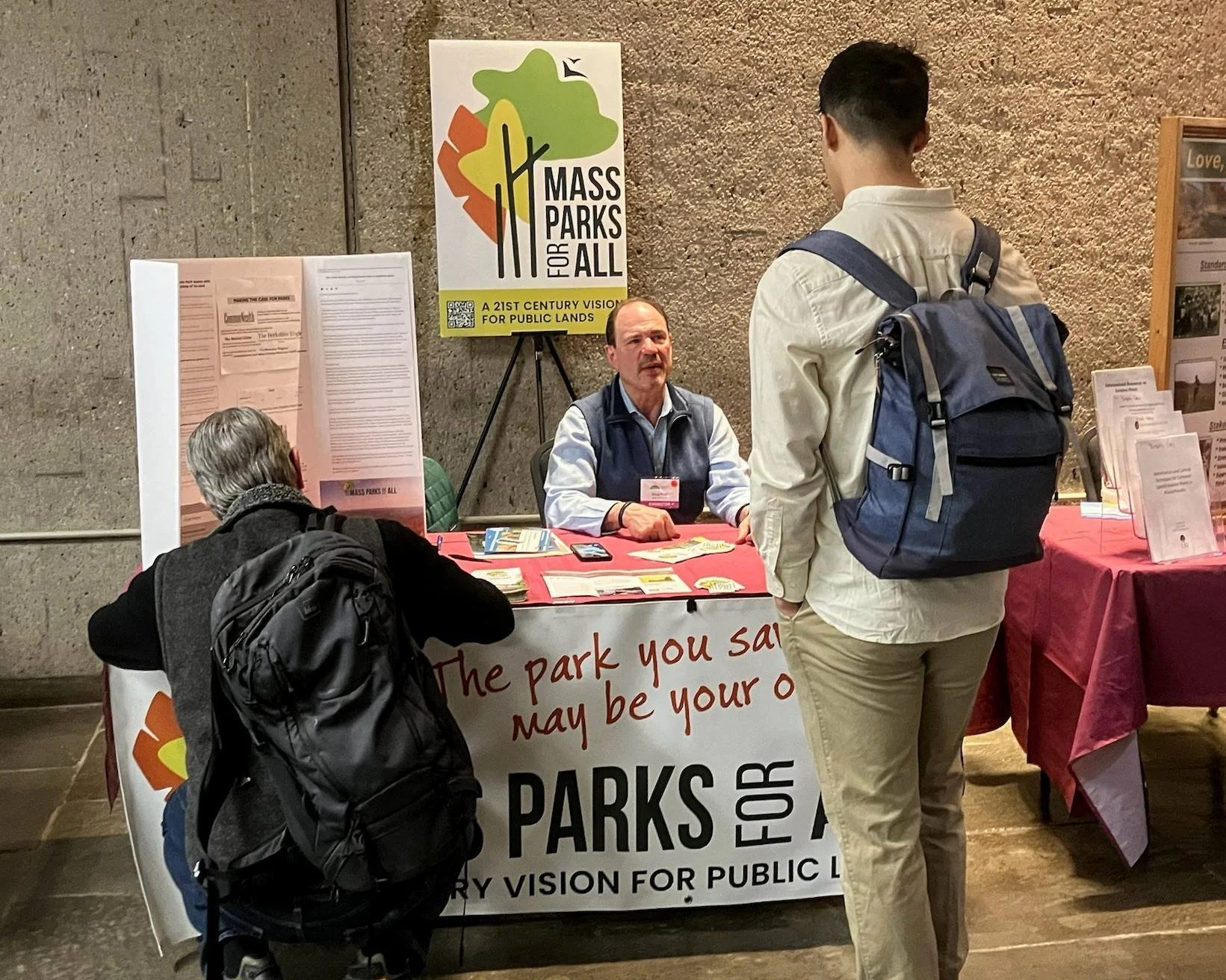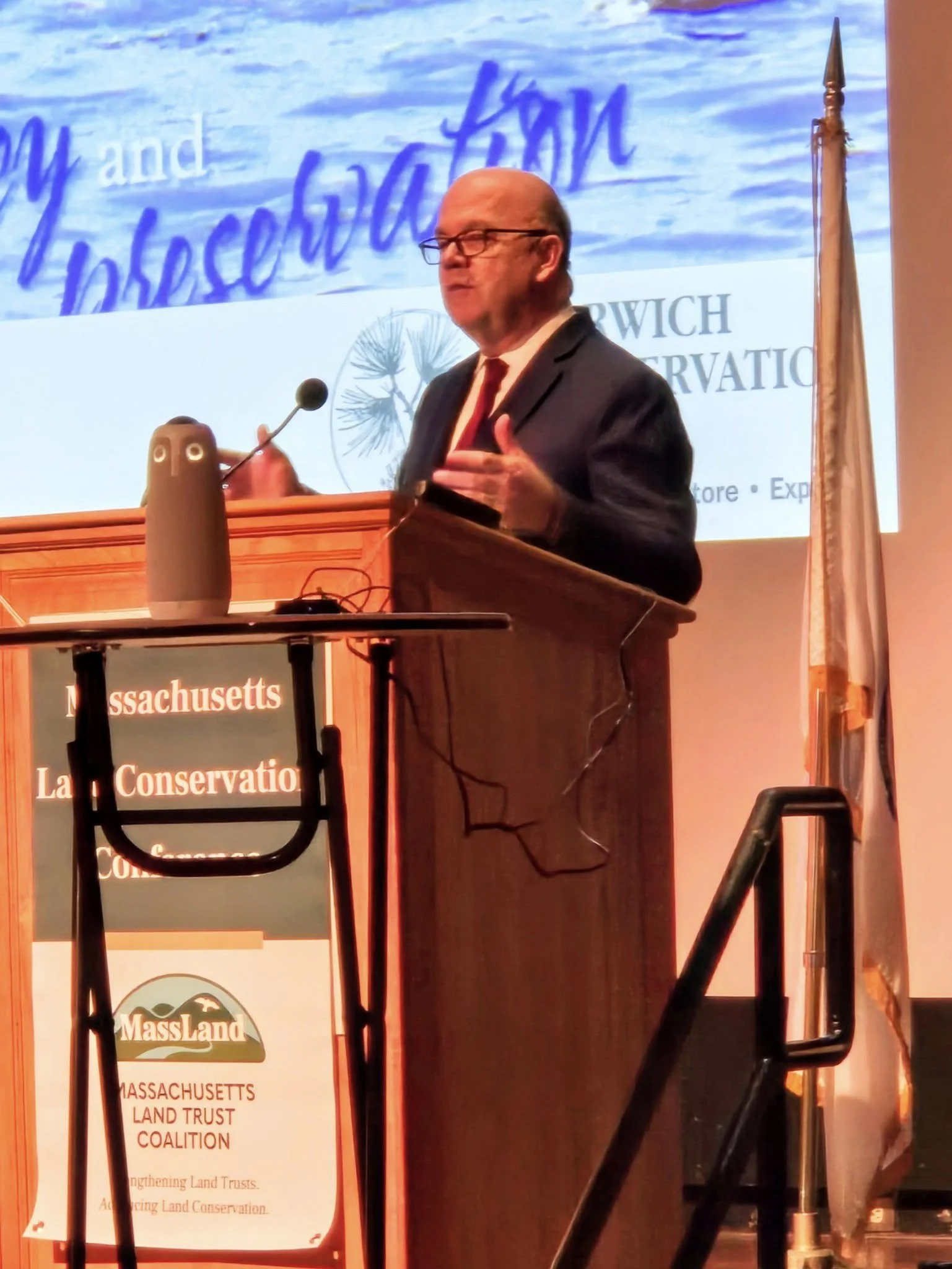Rep. McGovern hopeful land conservation will continue despite federal cuts
AMHERST – U.S. Rep. Jim McGovern told a packed house that land conservationists must redouble their efforts to protect our precious natural resources in the face of massive cuts in federal environmental spending.
Mass Parks for All (MPA) attended the conference to promote our work to renew, expand and protect our state parks and other public open space. MPA is the only statewide non-profit organization with this mission as its primary focus.
McGovern, a Worcester Democrat, was the keynote speaker at the Mass Land Trust Coalition’s annual conference on Friday, March 21, at UMass Amherst. Elected to the House of Representatives in 1996, he was instrumental in getting the Land and Water Conservation Fund reauthorized and making that authorization permanent. The fund helps pay for land conservation with money from fees placed on offshore oil and gas leases. Bipartisan support at the time defeated plans to eliminate the program.
McGovern said he has seen a lot in his years on Capitol Hill as various congressional sessions and presidential administrations have come and gone.
“But I’ve never, ever seen anything like what we’re seeing now,” he said.
While the effects are being felt all over the nation, closer to home, there are plans to close the Fish and Wildlife Service office in Hadley, and the United States Department of Agriculture office in Amherst, both in his congressional district. He also said the National Park Service being able to conduct its mission is at risk.
He urged those advocates not to give up or give in.
“I believe that there are ways we can still make progress on conservation,” he said, noting that the conservation ethic, as it did in 1997, has supporters on both sides of the aisle.
“And I urge all of you to think about ways that you can build bridges at the grass roots level, and across the country with people who share your conservation value,” he said. “It means working with people where you might not agree on anything else, quite frankly.”
He said in the end, people engaged in land conservation are building resilience, socially, by providing access to the natural world, as well as environmentally, and out of the box thinking is a necessity if we are to preserve the gains we have made.
“If we do that, we will get through this,” he said. “Thank you for all that you’re doing, and please keep going.”
National Park System cuts could affect state parks
While no one knows for sure, officials are concerned that cuts at National Park Service properties in Massachusetts may drive increased visits to state parks.
Across the board staffing cuts at NPS, some of which were ordered restored by judges, along with spending limits that included a $1.00 limit on government issued credit cards, have thrown the summer season into turmoil as Americans prepare to celebrate our 250th anniversary as a nation.
NPS operates a combination of sites and trails in Massachusetts, including the Boston Harbor Islands in conjunction with the City of Boston and the state Department of Conservation and Recreation (DCR). Other properties and trails include The Freedom Trail in Boston, The John Fitzgerald Kennedy and Frederick Law Olmsted National Historic Sites, both in Brookline, the Cape Cod National Seashore, Lowell National Historical Park, the New Bedford Whaling Museum, and the Appalachian Trail.
According to a March 11 post on Boston.com, “…around 40 probationary staff from National Historic Sites from New Jersey to Maine were terminated. Bill Wade, the executive director of the Association of National Park Rangers, says about ten of those were from Massachusetts sites.
The Association of National Park Rangers, along with former employees, have reported firings of three people at Cape Cod National Seashore, two at Boston National Historic Park, three at Lowell National Historical Park, one at Minute Man National Park, and one at the Springfield Armory.”
It could not be determined before publication if court orders to reinstate fired probationary workers will reverse these staffing cuts. But other reductions at the NPS may also have a negative impact on a major tourism draw to Massachusetts.
Meanwhile, state officials are concerned about federal grant money that comes directly back to DCR. The Healey-Driscoll Administration’s proposed budget, H.1, submitted to the Legislature in February, anticipates doubling federal grant money coming to the state from $10 million this year to $20 million for FY2026, which starts July 1, 2025.
Federally funded programs administered by DCR include two programs administered by the Federal Emergency Management Agency (FEMA), which itself is targeted for elimination. They are flood insurance community assistance ($400,000) and Dam Safety and Dam Rehabilitation ($2.8 million and $3.8 million, respectively). Other programs administered by DCR that receive federal assistance include Asian Longhorn Beetle Eradication, Forest Stewardship Conservation and Education, State Fire Assistance, Community Wildfire Defense, Recreational Trails Grant Program, and Aquatic Invasive Species Management.
As of right now, the federal government is honoring existing contracts with DCR, although reimbursements for work already completed are coming in more slowly than in the past. In addition to concern about grant programs that may be cut, officials are also concerned that an increase in visitors to state facilities because of a reduction in capacity at NPS sites will cause maintenance and staffing issues at DCR facilities.
Save the Date, Serve a Park
In conjunction with Earth Week, Saturday, April 26 is Park Serve Day. Started in 2006 to encourage grassroots stewardship in our state parks, Park Serve Day has grown into an annual event attracting thousands of volunteers to clean up and perform other restorative tasks to get our parks ready for the summer peak season.
Visit the DCR website for scheduled events at a park near you. And of course, there are always volunteer opportunities at our parks all year long.
Environmental Bond Bill Filing Delayed
The Healey-Driscoll Administration had initially planned to file the new five-year Environmental Bond Bill in conjunction with the observation of Earth Day, April 22. However, the Administration has informed the Environmental Bond Coalition, of which MPA is a member, that it is now looking at filing the bill with the Legislature sometime in May.
State Bond Bills provide borrowing authorization for capital projects over a five-year period to supplement annual agency capital budgets. This year, DCR has a $152.3 million capital spending plan. For the last five years, MPA has been advocating for DCR to have a $250 million capital spending budget each fiscal year. This would allow DCR to dig out of the $1.0 billion deferred maintenance backlog accumulated over about a dozen years of underfunding during and after the 2008 recession while keeping up with current capital needs.
The last Environmental Bond Bill was enacted in 2018. MPA is focusing on two line items in that bill for the new bill. We would like to see the general-purpose park project line item (2840-7025) increase from $420 million to $600 million, and the parkway, boulevards, and multi-use trails line item (2890-7034) increase from $160 million to $400 million. About $400 million of DCR’s deferred maintenance backlog consists of parkways projects.
As the bill is assembled and makes its way through the Legislature, MPA wants to rally park friends groups and other stakeholders to organize in support of making sure DCR gets its fair share of the authorizations in the final bill. Dubbed our Friends of the Friends Campaign, step one is assembling a database now containing more than 200 organizations that support parks in some way. Watch this space for more information in the near future.
Doug Pizzi is executive director of Mass Parks for All


